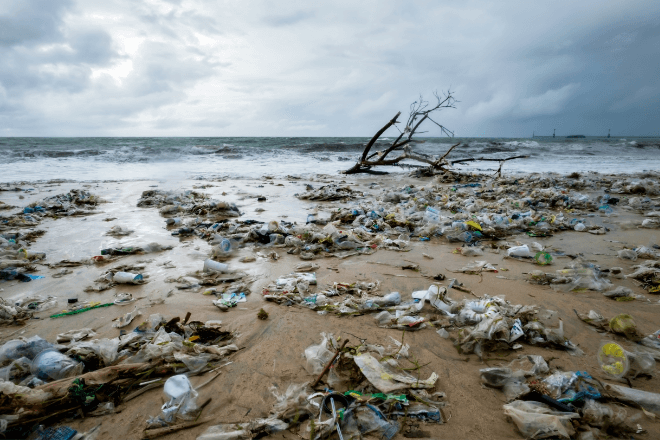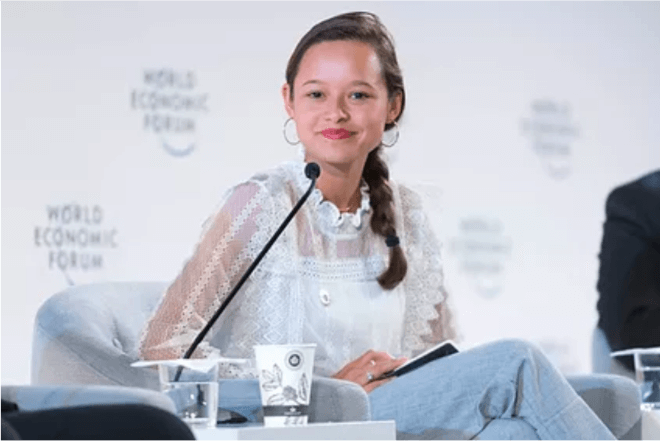
Melati Wijsen was 12 years old when she realized that Bali, the island paradise she grew up in, had also become a haven for trash. “Bali, growing up, it was the perfect paradise island that everybody always talked about as the island of gods. But we saw a very different reality—Bali, the island of plastics.”
The problem prompted Melati and her younger sister, Isabel, to start a campaign in 2013 to stop using single-use plastic bags in Bali. “It's already reported and studies already find that every week we are ingesting 5 grams—a credit card's worth—of plastic pollution every single week. Can you imagine what is the future we are heading to? What will happen if we do not take action now?,” said Melati, now 20, in her keynote during the Southeast Asia Development Symposium 2021 held in March.

In 2015, US advocacy group Ocean Conservancy estimated that up to 60% of marine plastic pollution comes from five countries in Asia: the Philippines, Indonesia, Thailand, Viet Nam, and the People’s Republic of China.
Taking on the challenge of fighting plastic pollution in Bali, the Wijsen sisters started Bye Bye Plastic Bags to raise awareness about the problem. “We started a conversation about plastic pollution and we did that through fun ways,” said Melati.
Melati has been relentless in her fight against plastic pollution. Here are four pointers on how to make impactful change based on what she has done over the years.
• Be creative
Early on, Melati knew they had to get creative to get people to listen. They did exactly that with Bye Bye Plastic Bags. Among their first campaigns was a fashion show where the sisters and their fellow campaigners modeled clothes and accessories made from recycled trash. Recycling trash to give them new life is now going mainstream with brands like Patagonia and Adidas churning out apparel made from recycled plastic.
In 2014, Bye Bye Plastic Bags also piloted a campaign to help one of the villages on the island become plastic bag-free. The sisters and their fellow campaigners met with the local government and residents to raise awareness about the issue. They also donated alternative bags to residents, leading to 60% reduction in the use of single-use plastics bags among villagers.
Another campaign involved recognizing like-minded businesses, like shops, restaurants, and hotels, through a sticker system, akin to the reward system used in classrooms. Bye Bye Plastic Bags’ stickers also served to promote the businesses as “eco champions.”
• Start a social enterprise
In 2017, Bye Bye Plastic Bags set up social enterprise Mountain Mamas, which makes alternative bags made from recycled items. The social enterprise also provides livelihoods to the women living in a village at the base of Mt. Batu Karu in Bali. In her keynote, Melati said Mountain Mamas has made bags out of an old skirt from Isabel and bedsheets from a hotel. “Voila, a bag. No excuse to say no to single-use plastic bags.”
In its website, Bye Bye Plastic Bags said Mountain Mamas is a way of bringing the circular economy to life. The circular economy is based on the idea of reusing and recycling products and materials so no waste goes to landfills. It is one of the green opportunities the Asian Development Bank (ADB) has identified that can help Southeast Asian countries recover from the pandemic.
When they launched the social enterprise, Bye Bye Plastic Bags committed that for every bag sold, a bag will be donated to a villager.
• Get your hands dirty
As the founder of a youth-led initiative fighting plastic pollution, Melati gets her hands dirty too, with all the cleanup campaigns Bye Bye Plastic Bags has organized over the years. For instance, they have an annual cleanup throughout the island as a way to highlight the urgency of the problem.
“We've hosted this cleanup for the last 5 years and we've mobilized over 60,000 individuals and prevented over 130 tons of plastic from entering the ocean. While we know cleanups are only a tool of awareness and not at all the solution, we do feel like it is a great way to get people out there taking the first step.”
Bye Bye Plastic Bags has also partnered with global organizations fighting plastic pollution to create booms that would collect trash from Bali’s rivers. Participants were encouraged to create booms from recycled plastic.
• Marshal the youth
Melati said raising awareness is key to what Bye Bye Plastic Bags has been doing over the years. “As a youth-led organization we know the power of knowledge, we know that change starts in the classroom. If the younger generation does not know the problem, how can we be an active part of the solutions.”
So far, Bye Bye Plastic Bags has spoken to more than 200,000 students all around the world and given workshops on how to take action.
It has also produced an educational booklet for primary students in Indonesia about plastic pollution. The book was distributed to 30 schools across Indonesia.
Thanks to Bye Bye Plastic Bags, in 2019, Bali finally became plastic bag-free.
Despite her accomplishments, Melati wished the changes she has been lobbying for could come more quickly. “As a young change maker, my strongest frustration is the fact that there we are changing too slowly. We know that we do not have that luxury of time, so throughout my 7 years experience, I truly believe that young people can accelerate change especially the change that we wish to see and it's not only about plastic pollution.”
Melati said young people also need to make their voice heard about meeting the Sustainable Development Goals. “We need to be bolder in our ambitions, be bolder in our goals.”
She stressed the need to empower young people to help make the changes the world needs. This is why she set up YOUTHTOPIA Voices, which is focused on empowering young people globally to accelerate change. “Invite us into your meeting rooms. Invite us into your brainstorming rooms, because we have ideas. We have demands that we want to see come into place. Allow us to be part of the journey of creating change with you,” she said.
“Us kids may only be 25% of the world’s population, but we are 100% of the future.”

